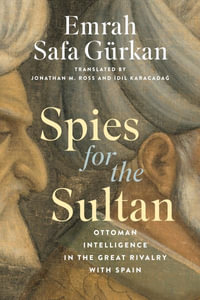`Julian Casanova is one of the most exciting and innovative historians working in Spain today. His books on the role of the Catholic Church in the Spanish Civil War, on anarchism and on the Francoist repression have earned him an enviable international reputation. In The Spanish Republic and Civil War, his characteristically impressive empirical reseach is crowned by a lively style adorned with penetrating insights.' Paul Preston, Professor in International History at the London School of Economics and Political Science, and Director of the Canada Blanch Centre for Contemporary Spanish Studies
`Julian Casanova, one of Spain's leading historians, has written a comprehensive and dynamic account that avoids standard cliches and lays bare the complexities of Europe's most intricate domestic drama during the years preceding World War II Stanley Payne, Emeritus Professor of History, University of Wisconsin-Madison
`Julian Casanova's book is a grand synthesis in the most positive sense. The authors calmly integrates the most recent scholarship, demonstrating that the decline into civil war was not inevitable and how the Second Republic was debilitated as much by political and social framentation as by polarisation. At the current moment of considerable controversy over the politics of memory in Spain, the importance of this highly readable and rigorously objective account of both the origins and experience of the civil war, which subtly draws attention to the complexities of Spain's history in the 1930s, can hardly be overstated.' Michael Richards, Reader in Spanish History, University of the West of England
Industry Reviews
'Julian Casanova is one of the most exciting and innovative historians working in Spain today. His books on the role of the Catholic Church in the Spanish Civil War, on anarchism and on the Francoist repression have earned him an enviable international reputation. In The Spanish Republic and Civil War, his characteristically impressive empirical research is crowned by a lively style adorned with penetrating insights.' Paul Preston, London School of Economics and Political Science 'Julian Casanova, one of Spain's leading historians, has written a comprehensive and dynamic account that avoids standard cliches and lays bare the complexities of Europe's most intricate domestic drama during the years preceding World War II.' Stanley Payne, University of Wisconsin, Madison 'Julian Casanova's book is a grand synthesis in the most positive sense. The author calmly integrates the most recent scholarship, demonstrating that the decline into civil war was not inevitable and how the Second Republic was debilitated as much by political and social fragmentation as by polarisation. At the current moment of considerable controversy over the politics of memory in Spain, the importance of this highly readable and rigorously objective account of both the origins and experience of the civil war, which subtly draws attention to the complexities of Spain's history in the 1930s, can hardly be overstated.' Michael Richards, University of the West of England 'Casanova's book must stand beside the very best on the Republic and Civil War available to an English-language readership.' New Left Review 'This book is one that should find many audiences - historians of modern Spain, general readers interested in a readable one-volume introduction to the 1930s in Spain, and other[s] following broader developments in Europe.' Bulletin for Spanish and Portuguese Historical Studies '... an excellent introduction to the troubled years between the formation of the Second Republic in April 1931 and Franco's victory eight years later.' History 'Casanova manages to achieve a good balance between synthesis, when scholarly consensus is broad; exposition, when historiographical positions do not agree; and intervention, when his own conclusions are warranted.' Pamela Radcliff, International Journal of Interdisciplinary History '... a sophisticated political narrative of 1930s Spain ...' Scott Eastman, Journal of World History
























